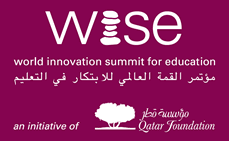EXCLUSIVE: Education Update On Location in Qatar for the 2011 WISE Conference
The World Innovation Summit for Education: an Oxymoron?
By Vicki Cobb
 REPORTING FROM DOHA, QATAR
REPORTING FROM DOHA, QATAR
As conferences go, the World Innovation Summit for Education, is small — only 1,200 attendees — but mighty. Powerful advocates for education from 120 countries met from Nov. 1-3 in the brand new conference center in Doha (built to accommodate 40,0000 participants) to discuss the theme: Changing Societies, Changing Education. The first day was filled with the usual generalizations, no real innovations in sight.
It started with consensus — everyone agrees that technology and communication across the globe is a game changer, that people need more than a high school diploma to achieve a middle-class lifestyle and the enrollment in higher education reflect this. In the past 10 years, the number of students in college worldwide jumped from 100 million to 150 million. And despite technology, we’re not innovating enough when it comes to content. The old-fashioned delivery of knowledge by the teacher as assessed by tests still rules most classrooms.
“If knowledge is now a Google search away — virtually at one’s finger tip—and students are using searches on the Web to drive their own learning, we need to figure out a different form of assessment to evaluate what they know,” said Professor José Mariano Gaga, former chairman of the Initiative for Science in Europe (ISE) and former Portuguese Minister of Science. One innovation that is driving this student-directed learning is the open education platform where all educational materials are free. One can only question the quality of these materials since many commercial producers of the high-quality materials cannot afford to give away their work without some form of remuneration. This issue was not addressed.
People agree that innovation is happening at the grassroots level by individuals. But the devil is in the details. How can a program or a project that depends on a single passionate individual be scaled up? Perhaps it can’t.
Finland’s schools have one of the highest success rates. Professor Jorma Routti is one of the founders of Finnish venture capital and one of Europe’s leading technology experts. Education is key to the economic success of Finland, which has undergone a transformation in the past 10 years from a resource-based economy (largely, the paper industry, which depends on trees) to a knowledge-based economy (driven by Nokia, the highly successful electronics giant).
What drove the change? “We dug ourselves into a very deep financial hole. It took long-range planning and an over-arching shared vision by all stakeholders to make this happen. But everyone had taken a financial hit and so we had to plan to invest.” Teachers in Finland get a modest salary but teaching is an esteemed profession. There is a culture of education in the small country that is supported by parents involvement with their children’s learning. “Education cannot be rushed,” says Professor Routti. “There are not short cuts, no magic bullets. It takes nine months to make a baby and 33 years to make an engineer.” #
